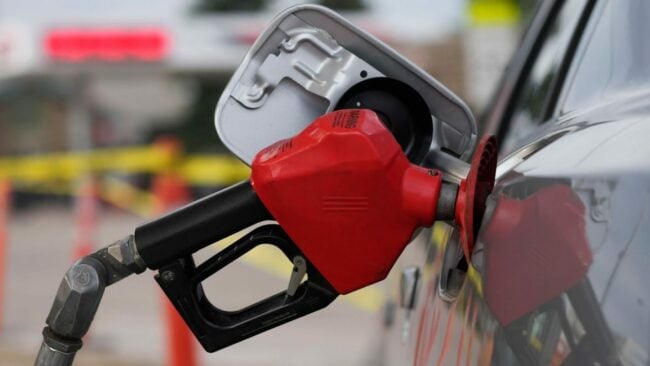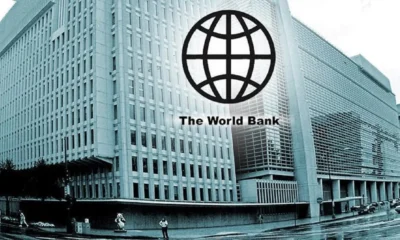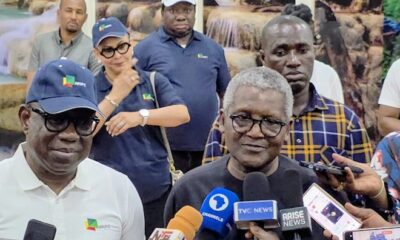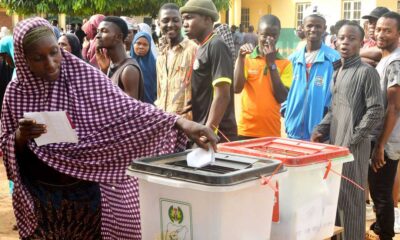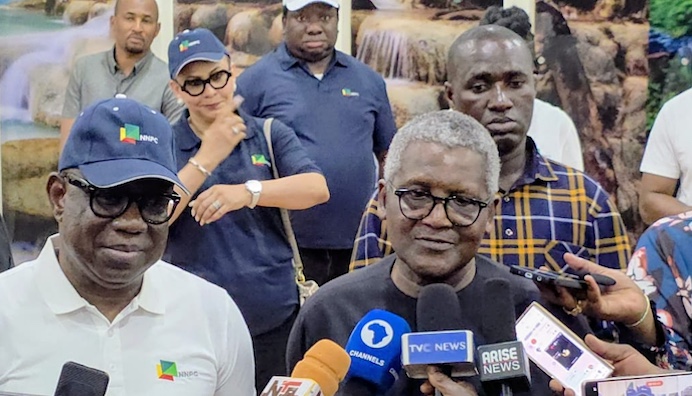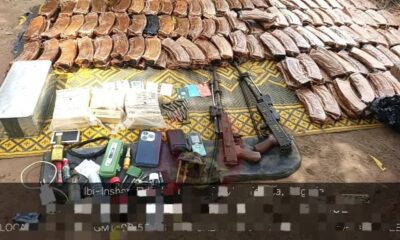Petroleum marketers have warned that the pump price of Premium Motor Spirit, popularly called petrol, could exceed N1,000 per litre following President Bola Tinubu’s approval of a 15 per cent ad valorem import tariff on fuel imports.
The new policy, which takes effect after a 30-day transition period expected to end on 21 November 2025, is part of the government’s strategy to protect local refiners and reduce the influx of cheaper imported products that threaten domestic refining investments.
However, marketers say the move could backfire and push retail prices beyond the reach of average Nigerians.
Commenting in a telephone interview on Thursday, multiple depot operators with knowledge of the matter, who spoke on condition of anonymity, said the decision could further raise the price of petrol, which already sells for around N920 per litre, in many parts of the country.
“As it is, the price of fuel may go above N1,000 per litre. I don’t know why the government will be adding more to people’s suffering,” one of the depot operators said.
Another depot operator added, “Unfortunately, some of the importers are working in alignment with Dangote, which is why the last price increase was general; all players raised their prices at once. Let’s just wait and see what happens next.”
Another operator added that without a clear framework to stabilise market forces and ensure fair competition, the new import duty could trigger another round of price hikes and worsen the hardship faced by consumers.
The National Vice-President of the Independent Petroleum Marketers Association of Nigeria, Hammed Fashola, also agreed that the tariff had its implications, saying it might lead to a price surge.
Fashola said the policy had both positive and negative effects, adding that it could discourage importation while promoting local refining.
The IPMAN leader opined that some marketers moght perceive it as an opportunity to monopolise the sector in favour of Dangote and a few other refineries.
“The 15 per cent tariff on imported fuel has its own implications. Maybe the price will go up, and equally, it will discourage importers from bringing in fuel if it becomes too costly.
“But it has both negative and positive effects on the sector. I see that the government is trying to protect local refiners, but it will have its own implications because people will see it as a way of monopolising the industry for certain people. At the same time, the government aims to protect the local refiners.”
However, Fashola stressed that the failure of the local refiners to supply enough fuel into the domestic market could trigger a fuel crisis.
“If the local refiners fail, it will have its own implications. It may lead to scarcity, and people will not have an alternative. So, it has both positive and negative effects. That’s the way I see it,” he added.
On whether the development is in line with the Petroleum Industry Act, Fashola said, “I don’t think the government will do anything outside the law. They would not like to do anything against the PIA. Ordinarily, everybody would like to see that our local refineries are surviving and they are doing well, which is good for our economy. I don’t think it has anything to do with the PIA.”
In his advice to local refiners, especially the Nigerian National Petroleum Company Limited, Fashola urged them to live up to expectations. He sought the revamp of the Port Harcourt, Warri and Kaduna refineries.
“My advice or my prayer is to the new management of NNPC: the way they are going, I think they are going in the right direction, and they have to do it fast by bringing in investors to revive our refineries. If all NNPC refineries can come on board, it will solve a lot of problems. I hear people trying to say that maybe they’re going to practise monopoly, but that will not be there. This applies to other private refineries like BUA; when they are able to come up, I think that the fear of monopoly will not be there anymore. There will be competition among the refineries, and that will be good for us,” Fashola stated.
Meanwhile, the National President of the Petroleum Products Retail Outlet Owners Association of Nigeria, Billy Gillis-Harry, described the 15 per cent tariff as a win-win situation, stressing that the policy would be tested, though it is not a totally new policy.
“Our expectation is that at some point, it might be reviewed. We are looking for product availability and affordability. We must always keep an eagle eye on these two things. That’s what PETROAN will advise at this time. I want Nigerians to know that if we are looking for cheap fuel and we are driving everybody out of the business, the product will not be available, and then prices will skyrocket.
“As it is today, everybody is working with Dangote, and we know that Dangote cannot satisfy the country. So, there has to be a mix of product availability,” he added.
The PUNCH had earlier reported that President Tinubu approved the introduction of a 15 per cent ad valorem import duty on petrol and diesel imports into Nigeria.
The initiative is aimed at protecting local refineries and stabilising the downstream market. In a letter dated 21 October 2025, reported publicly on 30 October 2025, and addressed to the Attorney-General of the Federation and Minister of Justice, the Federal Inland Revenue Service and the Nigerian Midstream and Downstream Petroleum Regulatory Authority, Tinubu directed the immediate implementation of the tariff as part of what the government described as a “market-responsive import tariff framework.”
The letter, signed by his Private Secretary, Damilotun Aderemi, and obtained by our correspondent on Thursday, conveyed the President’s approval following a proposal by the Executive Chairman of the FIRS, Zacch Adedeji.
The proposal sought the application of a 15 per cent duty on the cost, insurance and freight value of imported petrol and diesel to align import costs with domestic market realities. The tariff is separate from the additional 5 per cent surcharge to be charged on locally produced and imported fuel in the new tax act, starting January 2026.
Adedeji, in his memo to the President, explained that the measure was part of ongoing reforms to boost local refining, ensure price stability, and strengthen the naira-based oil economy in line with the administration’s Renewed Hope Agenda for energy security and fiscal sustainability.
According to projections contained in the letter, the 15 per cent import duty could increase the landing cost of petrol by an estimated N99.72 per litre, based on an average daily consumption of 19.26 million litres as of September 2025. This translates to an additional N1.92bn in daily import costs and revenue to government coffers.
The letter read, “At current CIF levels, this represents an increment of approximately N99.72 per litre, which nudges imported landed costs towards local cost recovery without choking supply or inflating consumer prices beyond sustainable thresholds. Even with this adjustment, estimated Lagos pump prices would remain in the range of N964.72 per litre ($0.62), still significantly below regional averages such as Senegal ($1.76 per litre), Côte d’Ivoire ($1.52 per litre), and Ghana ($1.37 per litre).”
It added that payments are to be made into a designated Federal Government revenue account managed by the Nigeria Revenue Service, with verification and clearance oversight by the Nigerian Midstream and Downstream Petroleum Regulatory Authority.
“The core objective of this initiative is to operationalise crude transactions in local currency, strengthen local refining capacity, and ensure a stable, affordable supply of petroleum products across Nigeria,” Adedeji stated.
The FIRS boss also warned that the current misalignment between locally refined products and import parity pricing has created instability in the market.
“While domestic refining of petrol has begun to increase and diesel sufficiency has been achieved, price instability persists, partly due to the misalignment between local refiners and marketers,” he wrote.
He noted that import parity pricing, the benchmark for determining pump prices, often falls below cost recovery levels for local producers, particularly during foreign exchange and freight fluctuations, putting pressure on emerging domestic refineries.
Adedeji added that the government’s responsibility was now “twofold: to protect consumers and domestic producers from unfair pricing practices and collusion, while ensuring a level playing field for refiners to recover costs and attract investments.”
He argued that the new tariff framework would discourage duty-free fuel imports from undercutting domestic producers and foster a fair and competitive downstream environment.
The policy comes as Nigeria intensifies efforts to reduce dependence on imported petroleum products and ramp up domestic refining.
The 650,000 barrels-per-day Dangote Refinery in Lagos has commenced diesel and aviation fuel production, while modular refineries in Edo, Rivers and Imo states have started small-scale petrol refining.
However, despite these gains, petrol imports still account for up to 69 per cent of national demand during the 15 months between August 2024 and 10 October 2025.
The FIRS boss noted that the policy is not revenue-driven but corrective, introduced to align import costs with local production realities and prevent duty-free imports from undercutting domestic refineries that are just beginning to recover.
“While domestic refining of PMS has begun to increase and diesel self-sufficiency has been achieved, price instability persists,” the memo stated. “Import parity remains the benchmark for pricing but often sits below the cost-recovery point of local producers, particularly during currency and freight fluctuations.”
It warned that if left unchecked, these pricing distortions could undermine the viability of local refining at a critical time when investors are beginning to return to the sector following years of dormancy.
The new framework, the document added, is expected to encourage fresh investment in refining, storage, and logistics infrastructure while ensuring that local producers and marketers operate on a level playing field.
The tariff is backed by Sections 21 and 22 of the Petroleum Industry Act, which empower the NMDPRA to impose public service obligations on licensees to promote national energy security and economic development. Under Section 3(4) of the PIA, the President is also empowered to issue policy directives to the regulator to enforce such measures.
Under the presidential directive, the NMDPRA is to issue the necessary regulations and gazette publication while prioritising locally refined products in the issuance of import licences.
The regulator will also coordinate with the Implementation Committee on Crude and Refined Products Sales in Naira to oversee progress and determine when tariff adjustments or sunset clauses become necessary.
Tinubu also mandated the NMDPRA to review the tariff periodically, with a view to scaling it down or eliminating it as domestic refining capacity expands.
“In view of the foregoing, Your Excellency is respectfully invited to consider and, if deemed appropriate: approve the introduction of a 15 per cent tariff import duty on Premium Motor Spirit and diesel, to be assessed on the cost, insurance, and freight value at discharge, with all payments made into a designated Federal Government of Nigeria revenue account and verified by the Nigerian Midstream and Downstream Petroleum Regulatory Authority before discharge clearance.
“Direct the NMDPRA and the Nigeria Customs Service to implement a 15 per cent import duty on PMS and diesel, with effect after a 30-day transition period from the date of official notification. Direct the regulator to issue appropriate regulations in this regard and take local production into account first before the issuance of import licences.
“Direct a periodic review of the tariff rate and its continued necessity, including provision for scaling or sunset measures, as domestic Premium Motor Spirit refining capacity expands, under the oversight of the Implementation Committee on Crude and Refined Products Sales in Naira. Respectfully submitted for Your Excellency’s consideration and further directives.”
All of these prayers were approved by President Tinubu for immediate implementation on 21 October 2025.
Meanwhile, the NMDPRA spokesperson, George Ene-Ita, has assured of the full implementation of President Bola Tinubu’s newly approved 15 per cent fuel import tariff once it receives the formal directive from the government.
“We are the sector regulator, and once the policy comes into force, we will definitely play our regulatory role and midwife the process on behalf of the government,” the official told The PUNCH on Thursday. “As of now, I’m not aware of any official communication, but if it is true that the policy has been signed by the President, it will eventually get to us, and there will be no issue implementing it.”
The spokesperson further explained that the downstream market remains fully deregulated, meaning that market forces and competition among operators would determine pump prices once the tariff takes effect.
“Since it is a presidential directive, the template is already there to follow through,” the spokesperson added. “Prices may rise, stay the same, or even drop depending on competition and market realities. Personally, I don’t envisage any sharp increase because the government would have factored in stabilisation mechanisms to ensure that prices at the last mile don’t spiral out of control.”
However, energy analysts expressed caution, warning that while the policy could encourage patronage of local refineries and boost government revenue, it might also pose risks to energy security and retail prices.
An oil and gas expert, Olatide Jeremiah, told one of our correspondents that the new tariff would “inevitably add a mark-up of about N100 per litre to the landing cost of petrol and diesel,” potentially creating unfair price competition among suppliers.
“This move will drive demand towards local refineries and increase government income,” the expert noted. “But it could also trigger price hikes and short-term energy insecurity, as even top energy-producing nations still import about 10 to 15 per cent of their fuel needs. Completely cutting off imports through high tariffs could expose the country to supply risks. The introduction of a 15 per cent tariff will add a mark-up of about N100 per litre to the landing cost of petrol and diesel, and it will give unfair price competition to the supply players.”
Meanwhile, a prominent chieftain of the All Progressives Congress in Delta State, Chief Ayiri Emami, has faulted the President’s approval of a 15 per cent ad valorem import duty on petrol and diesel, warning that the move will worsen the suffering of ordinary Nigerians.
Emami, who is also the Chairman and Chief Executive Officer of A & E Group, an oil, construction and haulage company, raised the concerns at a press conference held in Abuja.
Speaking with journalists in Abuja, he lamented that the policy would “hurt the masses, not marketers.” The APC stalwart also urged the President to suspend it until the government provides more relief to Nigerians.
“Anybody advising Mr President to impose a 15 per cent tax on petroleum right now is not doing him any good. This kind of policy will not hurt marketers; it will hurt ordinary Nigerians. Whatever tax you put on petroleum goes straight back to the people on the streets. Nigerians are already hungry and struggling,” he said.
Emami also warned that the cost of fuel has already crippled daily livelihoods, particularly among rural and riverine communities dependent on fishing and transport.
“When you buy fuel, it determines whether you can even go out to fish. It’s not that the fish are gone; it’s that we can’t afford to reach them anymore,” he said.
“For me, that 15 per cent should be kept aside until the government provides more relief to Nigerians. Even after removing the fuel subsidy, we haven’t seen much positive reflection. Things are still hard. So why add another burden?”
The oil mogul also expressed fear that certain persons may have been misleading the President.
“Some people don’t care about Mr President or what he’s going through; they just want to create more problems. Those are my honest opinions on the matter,” he added.
Some Nigerians have also linked the development to recent comments by Africa’s richest man, Aliko Dangote, who on Sunday hinted that the Federal Government’s new policy direction in the downstream oil sector would help strengthen the naira against the dollar. On social media, user @az4top suggested that Dangote may have been referring to the newly approved 15 per cent fuel import tariff, which analysts say could reduce foreign exchange pressure by encouraging local refining and import substitution.
On X (formerly Twitter), user @Rufyb criticised the move, calling it “stupid” and questioning why the government would eliminate consumers’ options in a supposedly deregulated market. “You got FX allocations at special rates to build your refinery and operate in a free trade zone, fine. Then produce and let others do their business. The market should decide what consumers want. Import tariff, because why?” he wrote.
Another user, @OpeBee, faulted the policy as short-sighted, noting that the new tariff would come on top of a 5 per cent fuel surcharge scheduled for January 2026. “You raise the tariff on PMS by 15 per cent. There is also a 5 per cent surcharge next year, and people are defending this, saying it’s to discourage importation. The cascade of events to follow will be worse than importation,” he warned.
Similarly, @Mista_Jameel accused local refiners of hypocrisy, alleging that they “bypass Nigerian crude for cheaper U.S. crude” while limiting options for domestic importers. “NMDPRA’s own data shows where local supply stands, but it seems we’re in an era of alternative facts,” he added.
Others, however, welcomed the decision. Tech entrepreneur @markessien described the tariff as a “good step” that would protect Nigeria’s emerging refining sector. “Nigeria has a working refinery and another being built. Imported fuel should have a tariff,” he wrote. Another user, @haneefdin, echoed similar sentiments, thanking President Tinubu for “supporting domestic production.”
Yet critics like @Lawatem argued that the policy “gives Dangote Refinery control of the whole market, artificially boosts profits, and forces Nigerians to pay for inefficiency.” He added, “What’s the point of subsidy removal and supposed deregulation if we end up here?”
punch.ng
FOLLOW US ON:

